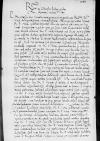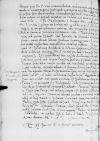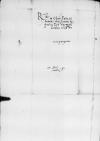Accepi proxime ⌊⌋ Reverendissimae Paternitatis Vestrae, quibus imprimis illa, de quibus ad eam ex ⌊Liuboml⌋ ⌊⌋, repetit. Quo ex ⌊loco⌋ cum ⌊Cracoviam⌋ rediissem, inveni alteras Reverendissimae Paternitatis Vestrae ⌊⌋ ad diem 1548-02-22⌊XXII Februarii1548-02-22⌋ ad me datas, quibus mihi negotia ⌊Georgii Manth⌋ et ⌊Cornelii a Staden⌋ civium Gedanensium commendare dignata est.
Sed ut primum ⌊⌋ respondeam, maiorem in modum cuperem, ut Reverendissima Paternitas Vestra, quemadmodum se velle scribit, ad iusta serenissimo ⌊regi seniori⌋ persolvenda ⌊huc⌋ venire possit. Id enim mihi multis de causis esset gratissimum, sed quoniam se Reverendissima Paternitas Vestra, quemadmodum et antea, affecta et infirma valetudine esse significat, intelligo, quam non facile id praestare possit, ita ut si ad ⌊conventum terrarum Prussiae⌋ per valetudinem Reverendissimae Paternitati Vestrae venire non licuerit, multo minus ob eandem causam ⌊huc⌋ ad funus regium ei venire liceat. Quod etsi nobis magno dolori est, quia tamen ita est Domino Deo visum, aequo animo ferendum est. Sacra etiam ⌊regia maiestas⌋ dolet ita Reverendissimam Paternitatem Vestram et aetate, et morbis ingravescentibus affectam esse ob idque hanc eius in funere sacrae ⌊regiae maiestatis paternae⌋ futuram absentiam aequo animo fert cupitque, ut Reverendissima Paternitas Vestra missis rei publicae negotiis, quibus, quoad per aetatem et valetudinem licuit, opera et diligentia sua non defuit, iam tandem in hac gravi aetate nihil aliud, quam valetudinem suam curaret diligenter.
Quod me de ⌊Alexandro⌋ ⌊ecclesiae suae⌋ hoste Reverendissima Paternitas Vestra admonet, curabo, ut quemadmodum hanc causam Reverendissimae Paternitatis Vestrae vivo serenissimo ⌊rege seniore⌋ diligenter tuebar, ita nunc omni studio et opera providerem, ne quid, praesertim quod contra dignitatem Reverendissimae Paternitatis Vestrae esset, pro illo homine obtineri possit. Quod mihi prioribus ⌊⌋ suis Reverendissima Paternitas Vestra negotia ⌊civium Gedanensium⌋ commendare voluit, iis certe opera et auxilio meo non defuissem, sed iam tum, cum litterae Reverendissimae Paternitatis Vestrae mihi redditae sunt, sacra ⌊regia maiestas senior⌋ e vivis excesserat et nemo illorum, quos Reverendissima Paternitas Vestra commendabat, coram me apparuit. Ita, quomodo se eorum negotia haberent, cognoscere non potui. Quae tamen, si postea ⌊huc⌋ devolventur commendationis Reverendissimae Paternitatis Vestrae causa, quantum potero et quoad aequitas rei tulerit, ⌊eos⌋ iuvare et promovere volo.
De matrimonio sacrae ⌊regiae maiestatis⌋ quid aliud Reverendissimae Paternitati Vestrae scribam, non habeo, nisi quod ea de re nihil sibi dici neque se a quoquam admoneri patitur, ita ut intelligi facile possit maiestatem suam in sententia permanere velle. Tractat nunc ea, quae ad funus serenissimi domini ⌊parentis sui⌋ obeundum necessaria sunt. ⌊Cuius⌋ etiam summum studium summaque cura est iustitiam tot annis neglectam aequabiliter omnibus reddere.
Porro, quid dominus ⌊palatinus Siradiensis⌋ a sacra ⌊caesarea catholica maiestate⌋ retulerit, arbitror Reverendissimam Paternitatem Vestram ex ⌊⌋ sacrae regiae maiestatis cognovisse. Etsi enim ⌊caesarea maiestas⌋ sua aperte declaraverit nolle se hoc iure, quod ad ⌊terras Prussiae⌋ habere se putat, cedere, tamen haec tota causa recidit ad tractatus permisitque ea[m] certis arbitris cognoscendam, et superarbitrum constituit sacram ⌊regiam maiestatem Rhomanorum⌋ ita ⌊regiae
<m>
aiestatis defunctae⌋ fide exigente. Quae res non satis nostros bene habet, cum fides arbitrorum suspecta sit, [n]unc praecipue, morte succedente ⌊regiae maiestatis senioris⌋, cuius maiestas maiori illuc affectu prosecuta est semper, quam nunc suspicamur. Proinde mutanda erit de arbitris illis sententia et verendum, ne tandem tractatus illi ad arma recidant. Quomodo tan[dem] haec res cedet aut quem exitum est habitura, Deus novit.
Fama ⌊huc⌋ pervenit ex ⌊Bieligrado⌋, ubi homines nostri cum loci illius hominibus commercia habent, ⌊Turcarum imperatorem⌋ a ⌊Persarum rege⌋ ad internecionem esse fusum, restare tam[en] adhuc imperatori Turcarum aliquam partem exercitus, cum quo illis in locis manet. Utinam vera sint, quae narrantur.
Alia, quae ⌊hinc⌋ scribam, non sunt.
Itaque iterum me Reverendissimae Paternitati Vestrae diligentissime commendo. Dominus Deus servet Reverendissimam Paternitatem Vestram nobis salvam diutissime et incolumem.



